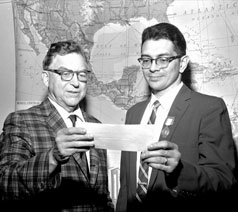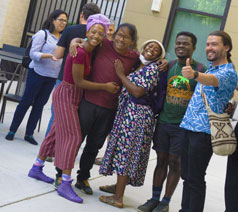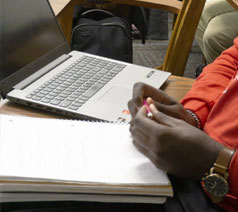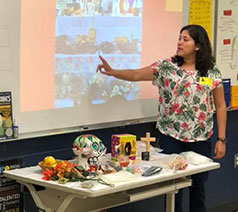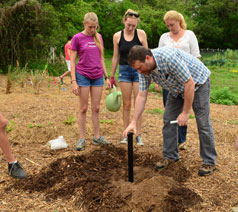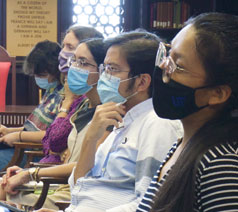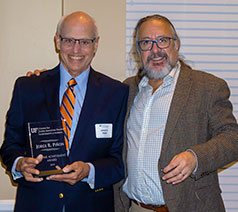Specialization Coordinator: Carmen Martínez Novo
The Indigenous Studies specialization connects students to courses that provide ethical, theoretical, and empirical approaches to working with Indigenous peoples and topics related to Indigenous affairs. Courses, seminars, and workshops associated with the specialization cover wide-ranging topics from Indigenous-state relations, social movements, political mobilization, conservation and development, rights-based claims, ethnobotanical relations, cultural traditions, research methodologies, and more. Specialization members benefit from our affiliated faculty across campus who have a range of theoretical and applied interdisciplinary perspectives and research opportunities in the arts, humanities, social sciences, and natural sciences. Our specialization meets regularly and hosts several events that are open to students and faculty across the UF campus.
- View recent courses relevant for Indigenous Studies
- View faculty & staff engaged with Indigenous Studies
PURPOSE OF LAS SPECIALIZATION RESEARCH AND LEARNING COMMUNITIES
- To help students and advisors to navigate the vast and constantly shifting curricular landscape supporting Latin American Studies at UF.
- To foster connection and collaboration around shared interests among current and prospective UF faculty, students, and partners.
Recent Courses Relevant for INDIGENOUS STUDIES SPECIALIZATION
- LAS 6938 Indigenous Ontologies
- LAS 6938 Indigenismo and Inter-ethnic Alliances in Latin America
- LAS 6938 Critical Indigenous Studies (new for fall 2023)
- LAS 6938 Local responses to climate change (new class 2023)
- LAS 6930 Ethnoecology and Conservation
- LAS 6290 Community Forest Management
- LAH 6934 Seminar in Colonial Spanish America
- ANG 6930 Sources of Law in Amazonia
- ANG 6186 Indigenous Archaeology and Heritage
- ANG 6930 Indigenous Amazonia and Amazonian Archaeology
- ARH 6666 Colonial Latin American Art
- ARH6918 Mesoamerican Art
- ARH6918 Ancient Andean Art
- ARH6918 Indigenous Arts of the Colonial Americas
- ARH6654 Pre-Columbian Art Seminar
Relevant Undergraduate Classes:
- LAH 4930 The Native Struggle for Justice in the Spanish Empire
- LAH 3130 Colonial Latin America
- HIS 3942 The Conquest of Mexico
- REL 2388/ANT 3930 Indigenous Religious Traditions of the Americas
- REL 3938/ANT 3939 Contemporary Shamanisms
- REL 3098/ANT 3930 Religion, Medicine and Healing
FREQUENCY OF COURSE OFFERINGS
Before each semester, the Center compiles and posts online a Guide to hundreds of LAS-related courses available in the coming semester. Some courses contributing to specializations are offered every semester, others once every few years. The list of courses provided here is not intended to guarantee any curricular offerings, but rather to open horizons to topics that have been and may be offered in widely varied programs around UF.
ADDITIONAL COURSES
Each specialization offers students the opportunity to craft personalized programs of study and to add their own contributions. Students may identify additional courses relevant for a specialization, including new and one-time offerings, and may seek approval from the Specialization Coordinator to count such courses toward specialization credits.
FACULTY ENGAGED WITH INDIGENOUS STUDIES
Indigenous Studies LAS Core Faculty:
Karen Kainer (Latin American Studies/Forest Resources and Conservation) Brazil, Mexico, Community-based forest management, Tropical forest ecology, Amazon conservation, and sustainable development
Carmen Martinez Novo (Latin American Studies, Ecuador, Andes, Amazon, Mexico), race and ethnicity, racism, Indigenous politics, indigenismo, Indigenous ontologies
Susan Paulson (Latin American Studies; Bolivia, Ecuador, and Brazil) Gender and Ethnoracial Systems Interacting with Environment, Political Ecology, Research Methodologies, Sustainability Science, Degrowth
John Richard Stepp (Anthropology, Latin American Studies; Mesoamerica) Cultural Ecology, Ecological Anthropology, Ethnobotany, Medical Anthropology, Visual Anthropology
Catherine Tucker (Latin American Studies and Anthropology; Central America, Mexico, and Peru) Ecological and Economic Anthropology, Environmental Governance, Community-Based Conservation, Institutional Analysis, Climate Change Adaptation, Belief Systems, Sustainability
Indigenous Studies LAS Affiliates:
Max Deardorff (History) colonial, race, native intellectuals, early modern Iberian, world religion, law
Michael Heckenberger (Anthropology, Amazon) Ethno-archaeology, Embodiment, Urban anthropology
Richard Kernaghan (Anthropology; Peru and Amazonia) Legal Anthropology, Ethnography and Ethnographic Writing, Roads and Indigenous Populations
Maya Stanfield-Mazzi (Art and Art History; Mesoamerica and Andes) Indigenous Art and Art History Art of Pre-Columbian and Colonial Latin America (colonial Peru)
Robin M. Wright (Department of Religion; Brazil) Religion, Medicine, and Healing; Shamanisms; Indigenous Religious Traditions; Indigenous Histories; Amazonia Brazil Indigenous Religious Traditions, Anthropology of Religion, Myth, Symbol & Ritual

